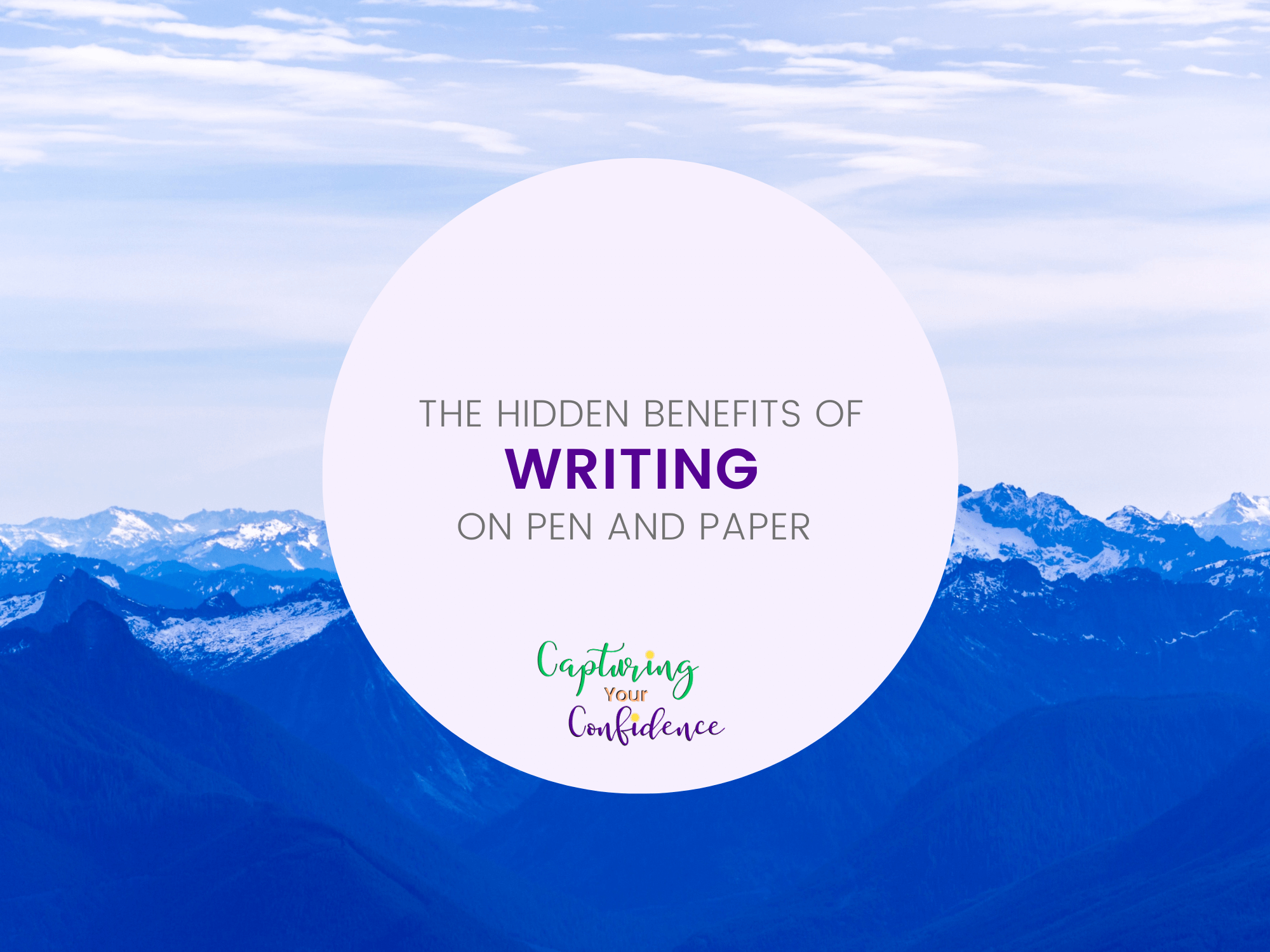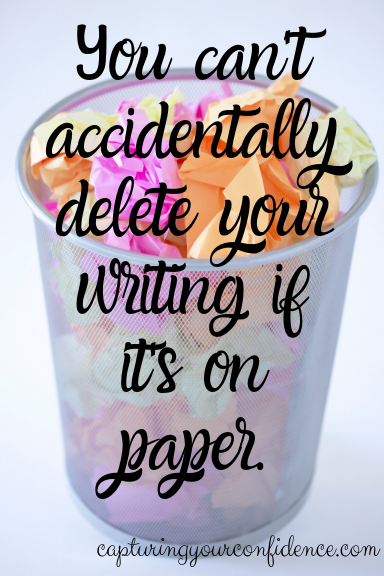The Hidden Benefits of Writing with Pen and Paper
When was the last time you wrote something by hand? What was it? A to do list? A grocery list? Maybe a note to your significant other/roommate/child?
I write to do lists every day, but rarely do I write longer words on paper anymore. I keep my creative work in a Google document and a Word document (for safe measure). I typically keep my blogs solely online in Google documents and my website.
But I used to write everything by hand. I have an entire novel manuscript from when I was in high school that was written out by hand with a trust pen and notebook.
I have been thinking a lot about this recently, as I begin to write more. I realized that I miss it. I miss the delicious feeling of a brand new pen sliding along a blank page. The visual of my thoughts becoming something on the page - a something that can’t accidentally be deleted with one wrong click of a button.
Now don’t get me wrong, digital technology can be incredibly useful! But it’s not always the best way to write. Here are 10 important reasons to pull out a notebook and write the old-fashioned way sometimes.
10. Allows for a global view of your writing.
When you’re typing, you can always scroll back through the document. If you make it tiny, you might be able to see all the pages at once, but you probably can’t read the writing at that point. When you have a pen and paper document, though, or, a typed and printed manuscript, you can lay those pages out on the floor or table and physically move them around to see how certain parts would sound in another area of the text. It’s pretty cool.
9. Allows you to see progress.
As you can see, most times we don’t always think in “final draft” form. We make mistakes, change working, and sometimes cut things out. In a pen and paper document, you have a record of what you’ve said and done. You can decide later whether your third draft wording is better than your first. With word processing, we don’t typically get that experience. Microsoft Word does have a track changes function, which is nifty. I’ve definitely used it before, but it’s not something you probably want on a first draft. Mine are way too messy for that - yikes!
Pen & paper first "page" of this blog
8. Acts as therapy.
I find handwriting more emotional than typing. It’s not that typing can’t have the same effect when put together (I see you, Eleanor & Park.) It’s more that my handwriting fluctuates with my mood. Angry writing is different than sad writing which is different than writing when in love. I like visually being able to see and remember the emotion in handwriting. Getting things out on paper and being able to see them visually is helpful for us to be able to process emotions and ideas and work through them.
7. Removes risk of accidentally deleting your writing.
This is a big one for me because I seem to be a master of losing documents by my own hand. Most of the time I can recover them, but that still causes a panicked irritation in the moment. I know I will keep paper all day long: obviously I still have handwritten writing from when I was much younger. So having a physical copy really help my peace of mind.
6. Removes risk of naming your document something “clever” and never finding it again.
How many times do we keep our original titles for writing? In my case, rarely. So finding a piece of writing with an old title you may or may not remember is like looking for a needle in a haystack. I could be searching for days without luck! Having too many documents is beside the point. When you write something with pen and paper, you can’t lose it to your own cleverness (or lack thereof).
5. Feels productive.
So, I wrote this blog out by hand first. I wanted to see how it felt, and it was great! A “normal” word processed blog with blog spacing (little paragraphs with lots of spacing) might be 3-5 pages typed out. My handwritten blog, with mock blog spacing, turned out to be 5 handwritten pages versus the 2.5 typed pages. The length was about the same, but I felt much more productive because I wrote 5 pages in a little over an hour!
This blog written out by hand!
4. Offers a much needed break from screen time.
I don’t know about you, but I spend a heck of a lot of time staring at a screen every day. I work at a job where I’m constantly on the computer, and then I will often come home and write/design/do administrative blog work on the computer. During the school year I also grade on the computer. It’s A LOT. Sometimes I just need to get away from that for awhile, you know? I think we all do.
3. Assists with memory.
Science has tied handwriting to improved memory. I find this very compelling. If you’ve met me for any length of time, you probably know that “if I don’t write it down, it’s not getting done (or remembered)” is pretty much a theme song of my life at this point. Long term memory? Great. Short term memory? Awful. So when I write with a pen and paper, it helps me imprint the idea onto my brain. It’s almost like physically writing allows the idea to skip the short term and go directly into the long term memory. Science for the win!
2. Forces you to slow down and think.
I don’t know about you, but I definitely can’t write nearly as fast as I can think. Typing alleviates this problem a bit, as I can type pretty quickly, but sometimes I don’t need to be going that fast. I like the idea that I have to slow down to write things down in a legible manner. So much of the time I’m hurrying or feel the need to rush. I don’t want my writing to feel like that, and I don’t want it to sound like that when you read it, so handwriting is a perfect solution.
https://www.youtube.com/watch?v=DS_j7mNru9w
Alister Stephens discusses his recent experiences with pen & paper writing.
1. Connects you to other writers.
I’ve always been a writer, a storyteller. And I’ve written A LOT over the years, with both pen and paper and word processing. There’s something about handwriting, though, that makes me feel like a writer. This definitely isn’t to say that people who only type are not. But writing is a craft people have been doing for hundreds of years! Many of my favorite books were written long before convenient word processing was available. Think about it for a moment: all of Jane Austen’s novels, for example, were carefully written out. Remembering this makes me feel like I’ve shared something with the authors of the books I hold dear. Where were your favorite books written? Can you imagine the author sitting at her writing desk scribbling away at a piece of paper or parchment?
Writing takes time in any form, and I’ll admit pen and paper does move a bit more slowly than typing. But in the extremely fast-paced world many of us live in, it’s actually a sweet reprieve. It’s not a negative experience because it’s “inefficient” but a reminder that sometimes the best thoughts occur when we slow down to let them.
What do you think? Have you written anything the old-fashioned way with pen and paper? What was your experience? Drop me an email or a comment below and let me tell me about it! I’d love to hear.











